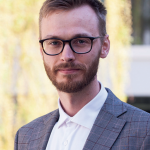The Activity 1.2.1.2. “Support for Improvement of Technology Transfer System” of the Specific Support Objective 1.2.1. “To increase investments of private sector in R&D” of the Operational Programme ”Growth and Employment”
Project „3D shape sensing fabric” (Project acronym – 3D FABRIC)
Agreement with Investment and Development Agency of Latvia (LIAA) No KC-L-2017/4 and No KC-PI-2017/25.
Scientific Project Manager: Rolands Savelis, e-mail: shavelis@edi.lv, phone: + 371 67558110.
The objective of the project is to develop the special strip of interconnected sensors (magnetometers, accelerometers, gyroscopes, etc.) for continuous monitoring of the deformations of the engineering constructions. The project aims to develop the technology for the technology readiness level TRL6.
The EDI research team has implemented the 3D surface shape-sensing technology in specially manufactured sensor strip which can be inseparably embedded into the constructions of the building or engineering structure. The sensor strip is connected to the data registration module and continuously provides data about the condition of relevant constructions (vibrations, irreversible movements, etc.). The technology can be used for various solutions, where the sensor strip is placed on the relevant object to read the data about the deformation or angular changes thereof. The technology can be used in industries where detection of deformation is a key, e.g., in carrying out engineering supervision over industrial engineering structures such as bridges, dams, high-rise buildings, and complex constructions.
The 3D technology includes an efficient solution for sensor wiring that allows to connect up to several hundreds of sensors, ensuring high surface reconstruction accuracy. As for computing resources, the technology includes efficient surface reconstruction algorithms enabling surface reconstruction on small computing resource devices (such as smartphones, tablet PCs, etc.) in real time (updates up to 50 times per second).
The 3D technology is an innovative technology, because the difference of EDI technology from other technologies lies in its ability to efficiently connect a lot of sensors in a strip, as well as the option to complement the 3D surface reconstruction sensors with the sensors of other kind, which can be used to detect such aspects as air temperature or the temperature of the object, pressure, moisture, light intensity, etc.
During the 2019 winter season the project scientific team conducted the adaptation of the accelerometer strip prototype and installation on supermarket “Spice” roof for monitoring deformation caused by the snow load and comparing the obtained data with reference sensor data from Ruki. The collected data were analysed and the results showed that there is a need for more accurate sensors with lower dependence of temperature.
Currently, three new accelerometer sensors (IIS2DLPC, BMA456, MMA8451) are being tested to select one sensor with the best parameters to be used in measurements.
In parallel the project researchers are working on software development in Matlab, temperature compensation algorithms, rotation quaternion component value range finding etc.
At the same time the commercialization expert and researchers are participating in a lot of networking activities and disseminating information about the technology prototype in the current development stage to the industry representatives. The project team has participated in various local and international exhibitions, fairs, workshops etc. in order to demonstrate the technology prototype and receive the mentoring support for commercialization of 3D Fabric technology. One of the recent international events, where 3D technology was presented was MIT Enterprise Forum Central & Eastern Europe in Poland, where the mentoring support for commercialization activities of 3D Fabric technology was received and useful contacts were established within Eastern European countries.
Place of project implementation – premises of the Institute of Electronics and Computer Science (EDI), 14 Dzerbenes, Riga.
Project duration: July 18, 2017 – April 30, 2021
Total project funding: 333 333, EUR, of which ERDF funding is 300 000,- EUR and EDI co-financing – 33 333,- EUR.

